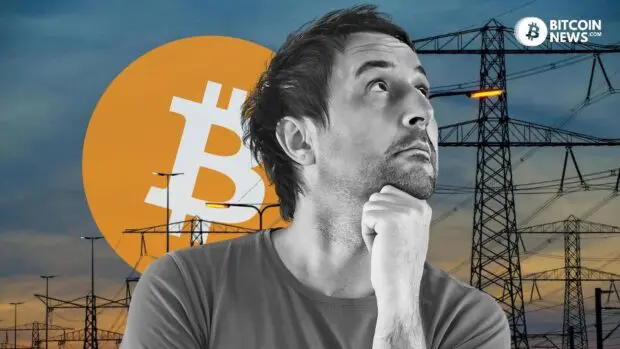In almost every conversation about Bitcoin today, the issue of Bitcoin energy consumption arises. This is primarily due to the influence of the Greenpeace controversy and the New York Times (NYT) narratives, having each published several articles discussing issues such as climate pollution and the alleged pressure Bitcoin mining places on electrical grids.
NYT and Greenpeace Controversy
These claims have been discredited and addressed by many Bitcoiners, such as Riot Platforms and one of their key figures, Pierre Rochard on his Twitter/X account. Many of these claims are still commonly believed and regurgitated by Bitcoin critics and laymen alike.
But there is a tendency not to trust industry professionals in their own industry. To deal with these claims, there are other documents, such as a brilliant study conducted by KPMG. This study has already done a great job at dealing with the issue of how Bitcoin fits into the ESG narrative and how it serves as a dynamic and resilient mechanism for demand response.
Meaning it supports electrical grids instead of destabilizing them as NYT suggested. This study also explains how Bitcoin mining is leading to the empowerment of the 770 million Sub-Saharan Africans who currently live with limited access to electricity, showcasing how this model might be adapted to other parts of the world in similar positions.
Related reading: What is Bitcoin Mining?
Bitcoin Energy Consumption: Reframing the Conversation
However, this article does not aim to rehash the same conversation on this topic, but rather to reframe the discussion: Why is some electricity use acceptable and others not?
Bitcoin mining machines, Application Specific Integrated Circuits (ASIC), are simply computers with a singular purpose: to hash. They are plugged in and assigned the duty of finding the next block in the Bitcoin blockchain. They use plain electricity like the allegedly “Green” electric vehicles (EVs) such as Teslas or Rivians.
Why is some electricity usage considered good, while others are wrong? Where does this double standard come from? Why is Bitcoin’s energy consumption less acceptable than that of EVs? Is there a conflict of interest between various News outlets and other organizations?
Energy Consumption
It is difficult to estimate the exact energy sources for the entire network, due to its decentralized nature. However, according to the KPMG study, 59% of the Bitcoin mining in the US is done with “renewable” electricity. This fact alone should make it the most ESG-compliant industry in the country, where the NYT is headquartered, and much of Greenpeace’s support base originates.
This is besides the point that despite this fact, organizations such as these will continually publish anti-Bitcoin articles because they fundamentally believe it is wasteful.
Bitcoin consumes as much energy as it does because many different miners worldwide wish to compete for the block reward (and the transaction fees). These miners pay for enough electricity to do so, seeing it as a worthwhile enterprise.
Bitcoiners value this as one of the most important aspects of Bitcoin, as it gives Bitcoin its unforgeable costliness, a term coined by Nick Szabo. It aims to explain the idea that today it would take an unfathomable amount of energy and thus money to commit fraud on the Bitcoin network.
The energy consumption means that Bitcoin is secure, and it is a fundamental part of why it has been able to provide financial services to those suffering under authoritarian regimes, such as those in Cuba, or allow Africans to transact across borders more freely without smartphones. Alex Gladstein of the Human Rights Foundation discusses many of these issues in his book Check Your Financial Privilege.
These fiat institutions may not see its value. Still, many of us from the developing world find value in Bitcoin, as well as those from nations like Canada, which imposed oppressive crackdowns on truckers protesting for freedom.
More people see their bank accounts get closed daily, such as Ye and Nigel Farage. These people need Bitcoin more and more every day, among many others who are financially excluded for various reasons. They need the only truly decentralized, most secure, censorship-resistant financial network the world has ever known.
Some believe spending a fraction of the world’s yearly energy consumption is worth the financial inclusion, protection from monetary debasement, censorship resistance, and many other issues not discussed here.
In fact, this should be contrasted and directly compared to the oppressive and unjust financial system that the US Dollar imposes. This financial network uses several orders of magnitude more energy than the Bitcoin Network through the expansive military that backs it as the primary component, and the brick-and-mortar stores which distribute the fiat as another.
There is no reason why Electric Vehicles, or any other electricity consumer, should be considered more valid than Bitcoin’s in electricity usage. Attempts to frame the conversation as such are disingenuous and should not be taken seriously.
The Conflict of Interest
Dealing with the second point, Greenpeace took what should be seen as a bribe from Chris Larsen, the founder of Ripple, the centralized entity issuing the XRP tokens. Ripple markets their token as a “Green alternative to Bitcoin,” a ridiculous notion covered in this author’s discussion about why Proof of Work is the only viable consensus mechanism.
Ripple is directly incentivized to promote this token, considering Chris Larsen is the single largest holder of XRP. Chris Larsen’s $5 Million “donation” has been used to run the Greenpeace campaign against Bitcoin Mining named “Change the Code,” but the campaign does not indicate that it is acting as an advertisement for the company.
This campaign can be witnessed on their low-engagement X profile: @CleanUpBitcoin, which refuses to engage with or meaningfully impact the open source network it asks to change, despite encouragement from many Bitcoiners on the platform.
Not All Actors Are The Same
While, unfortunately, the case for the NYT and other formerly reputable sources is not as clear cut as that of Greenpeace, it is still worth noting who owns the NYT and considering what they might benefit from an assault on Bitcoin.
The NYT, as of 23/10/2023, is owned by several of the largest institutional investors such as Vanguard Group, Blackrock Inc, and Berkshire Partners Holdings, as well as several other institutions, and the chairman A. G. Sulzberger Jr, whose family member acquired the publication in 1896.
To the author’s knowledge, it must be reiterated and emphasized that there is no direct evidence of malpractice on this count, and in fact, as Greenpeace’s article points out, many of the same actors are likely experimenting with Bitcoin themselves.
It must still be taken into account that these institutional investors directly benefit from the legacy financial system, which the Bitcoin network was developed to obviate and replace. These institutions all benefit from the endless credit expansion of the fiat world, while Bitcoin detracts from that with every new participant and each new block that is mined.
Or perhaps, less conspiratorially, criticizing Bitcoin during that time was just fashionable, and the media giant just needed more clicks to attract attention to many of its stories. Many of those narratives might have possibly lost reputation and notoriety due to hit pieces such as these.
Change The Conversation
Bitcoin’s energy consumption will continue to be seen as a negative and evil thing, as long as people struggle to understand why Bitcoiners continue to pay for it. We need to help people connect the dots and reframe the conversation to show others that opinions formed based on out-of-context statistics and headlines do not explain the full picture.
Bitcoin fixes many things, but will it fix supporting the current thing?










